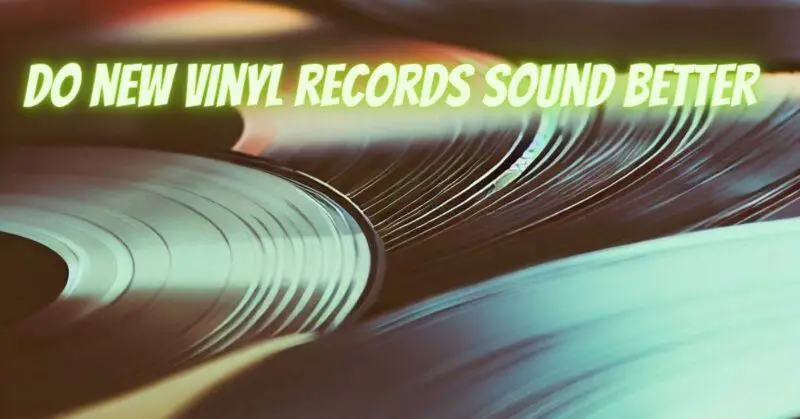In recent years, vinyl records have experienced a resurgence in popularity, attracting both longtime collectors and new enthusiasts. With this renewed interest, a common question arises: Do new vinyl records sound better than their digital counterparts? In this article, we will delve into the intricacies of vinyl sound reproduction and explore the truth behind the claim that new vinyl records offer superior audio quality.
The Analog Appeal:
One of the primary reasons for the enduring allure of vinyl records is the unique analog nature of their playback. Vinyl enthusiasts argue that the analog format captures a warmer, richer, and more immersive sound experience compared to the clinical precision of digital audio. This sentiment has fueled the belief that new vinyl records inherently sound better than their digital counterparts.
The Vinyl Manufacturing Process:
To understand the nuances of vinyl sound reproduction, it is essential to explore the manufacturing process. Vinyl records are created by cutting grooves onto a lacquer master, which is then used to create a metal stamper for pressing the records. This intricate process involves various factors that can impact the sound quality of the final product.
Mastering and Sound Quality:
The mastering stage of vinyl production plays a crucial role in the sound quality of the records. Mastering engineers carefully optimize the audio for vinyl, taking into account the format’s limitations and unique characteristics. This process involves adjusting the frequency response, dynamic range, and overall tonal balance to ensure optimal playback on vinyl.
However, it is worth noting that both vinyl and digital formats can be mastered well or poorly. A poorly mastered vinyl record will not automatically sound better than a well-mastered digital recording. The skill and expertise of the mastering engineer, regardless of the format, greatly influence the final sound quality.
Vinyl Sound Characteristics:
Vinyl records possess specific sonic characteristics that contribute to their distinctive sound. The analog playback introduces subtle imperfections, such as surface noise, crackles, and pops, which some listeners find charming and nostalgic. Additionally, vinyl tends to exhibit a unique frequency response, with a slight emphasis on the midrange and a rolled-off high-end compared to digital audio.
Subjectivity and Personal Preference:
The perception of sound quality is subjective and varies from person to person. Listeners have different preferences and priorities when it comes to audio reproduction. While some individuals appreciate the warm and vintage sound of vinyl, others may prefer the clarity and convenience offered by digital formats. Ultimately, the perception of whether new vinyl records sound better is largely a matter of personal preference.
Considerations for Vinyl Sound Quality:
Several factors can influence the sound quality of vinyl records, including the quality of the pressing, the condition of the turntable and stylus, and the overall care and handling of the records. Proper storage, regular cleaning, and using high-quality audio equipment are essential for maintaining optimal vinyl sound reproduction.
Conclusion:
The notion that new vinyl records inherently sound better than digital formats is not a universally applicable truth. While vinyl offers a unique and nostalgic listening experience with its analog charm, the sound quality of a vinyl record is influenced by various factors, including the mastering, pressing quality, and playback equipment. Ultimately, the preference for vinyl or digital audio boils down to individual taste and appreciation for the particular characteristics of each format. Embrace the medium that resonates with your musical enjoyment, and remember that the joy of music is ultimately about the emotions it evokes, regardless of the medium on which it is played.


